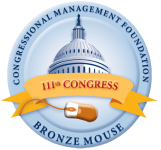
| Issues - Health Care |
 |
 |
In this section:
Health Care Reform Health Care ReformLast year, Rep. Holt supported the health reform package that is now law. In supporting reform, Rep. Holt said “I stand with the families, seniors, and small businesses who I represent and who will have greater control over their health care.” As a result of the health reform law, children with pre-existing conditions are no longer denied coverage, young people up to age 26 can stay on their parents’ plans, pregnant women and cancer patients are protected from insurance abuses, seniors pay less for their drugs, and small businesses have tax cuts to help them provide health insurance to their employees. Seniors have found that Medicare not only remains intact, but is improved – recipients are receiving free preventive care and better primary care. Click here for more information on how New Jersey families, seniors and business have benefitted from the health reform law.
Legislative Summary: Click here for a summary of the law.
FAQ: Click here for a detailed Q&A prepared by Rep. Holt, explaining what reform means for you.
Fact Sheets: Click each link to learn how reform helps Medicare beneficiaries, small businesses, and women.
Health Care for ChildrenRep. Holt supported legislation – which President Obama signed into law in February 2009 - expanding the State Children's Health Insurance Program (SCHIP) to ensure coverage for 11 million children, including an additional 116,000 New Jersey children who were uninsured prior to the bill’s passage. The law reauthorizes SCHIP over the next four and half years and provides dental coverage and parity for mental health treatment to all enrolled children. CRS Summary:The Children’s Health Insurance Program Reauthorization Act of 2009 (2-19-09)
Official Government Site:Health and Human Services CHIP homepage
“We can’t fix our economy if we don’t fix the health care system. As it is now, our health care system adds needless costs, inequality, and inefficiency that hobbles our economy. I support comprehensive health reform to cover the uninsured, improve the quality of care, focus on prevention, and bring spending under control.” – Rush Holt Rep. Holt believes that available, affordable, and accessible health insurance is attainable, and that it is unacceptable that there are 47 million Americans without health insurance. He is a longtime supporter of universal health care and he has worked to protect essential federal programs like Medicare and Medicaid and the State Children's Health Insurance Program (SCHIP). Mental Health ParityRep. Holt has fought in Congress for a strong mental health parity law. He was a cosponsor and voted for the enacted Paul Wellstone and Pete Domenici Mental Health Parity and Addiction Equity Act which will help the millions of Americans with private health insurance who suffer from mental illness finally receive the full access to the treatment they need and deserve with out higher co-pays or treatment limits. In November 2007, Rep. Rush Holt hosted a roundtable on mental health with local and national mental health advocates at Carrier Clinic in Belle Meade. Prescription Drugs and MedicareRush Holt strongly supports a Medicare prescription drug benefit that is meaningful, affordable, reliable, and voluntary. Each year prescription medicines become a more significant part of our health care system, and the implementation of comprehensive drug coverage is central to ensuring that Medicare can continue to provide for our nation’s seniors. Rep. Holt believes the existing Medicare Part D prescription drug benefit has many flaws, which is why he supports efforts to remedy the program’s problems and ensure that seniors have access to a comprehensive, voluntary, universal prescription drug benefit under Medicare. In the past, Rep. Holt has offered legislation to help seniors by including additional drug expenditures towards the “true out-of-pocket” costs that determine when a beneficiary is eligible for catastrophic coverage. This would be eligible sooner for additional help with their prescription drugs. In 2008, Rep. Holt voted for the Medicare Improvement for Patients and Providers Act of 2008, which prevented a scheduled 10.6 percent cut to the Medicare physician reimbursement rate in 2008 and 2009. The law, which also provides mental health parity for seniors on Medicare, was approved over President Bush’s veto. Medical Research
As a scientist, Rep. Holt understands both the life-saving value of medical research and the need to keep politics out of the scientific process.He has worked in Congress to support stem cell research, and was invited to the White House for President Obama’s signing of an executive order lifting the ban on federal funding for embryonic stem cell research. He also has worked consistently to increase funding, most recently in the economic recovery bill, for critical research at the National Institutes of Health, the Centers for Disease Control, and the National Science Foundation. These investments in scientific and health research will improve options for diagnosis, treatment, and prevention of life-threatening diseases such breast cancer, Parkinson’s Disease, and diabetes. Addressing the Nursing ShortageLast year, Congress passed and the President signed into law Rep. Holt’s initiative to address the nation’s nursing shortage by requiring the Institute of Medicine to study the constraints that the nation’s schools of nursing face and to propose short- and long-term solutions to address the nursing crisis. In 2006, the American Hospital Association estimated that 118,000 registered nurses were needed to fill vacant positions. The current recession has caused some nurses to delay retirement and some to resume their careers, providing a Band-Aid for the nursing shortage. This Band-Aid will evaporate once the recession ends and, according to the federal Health Resources and Service Administration, the nationwide nursing shortage will grow to one million by 2020.
Related Articles |


















